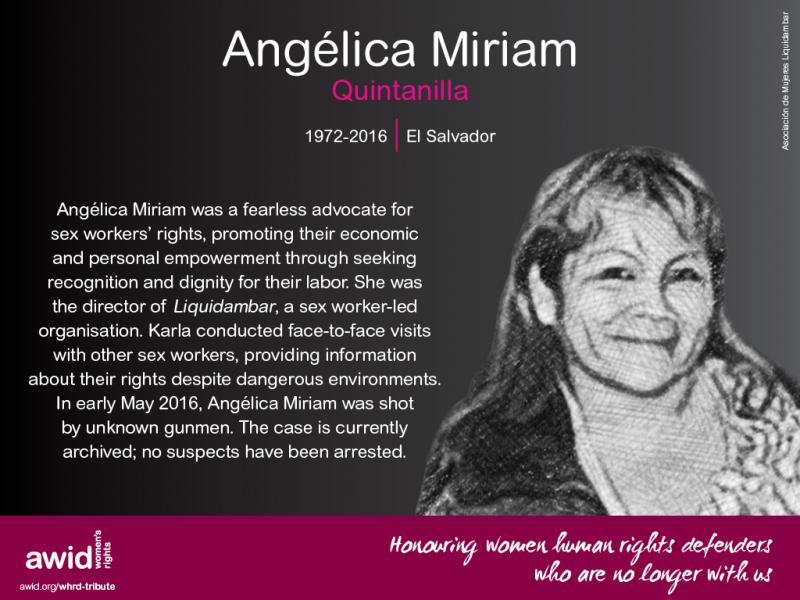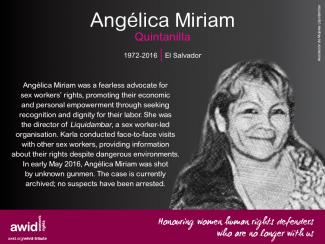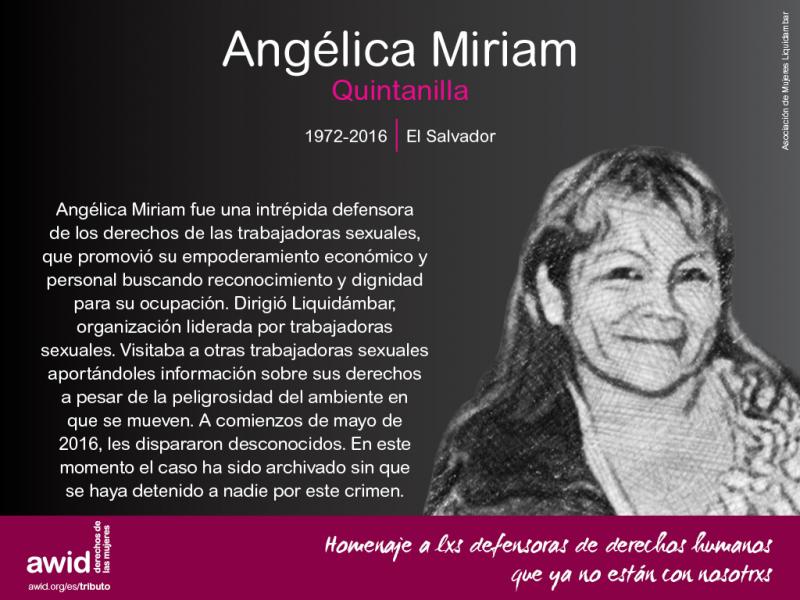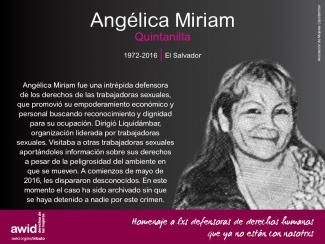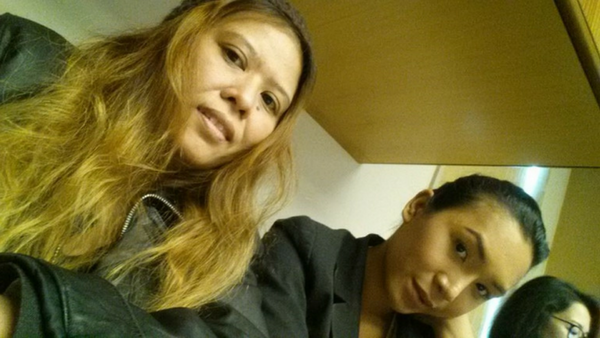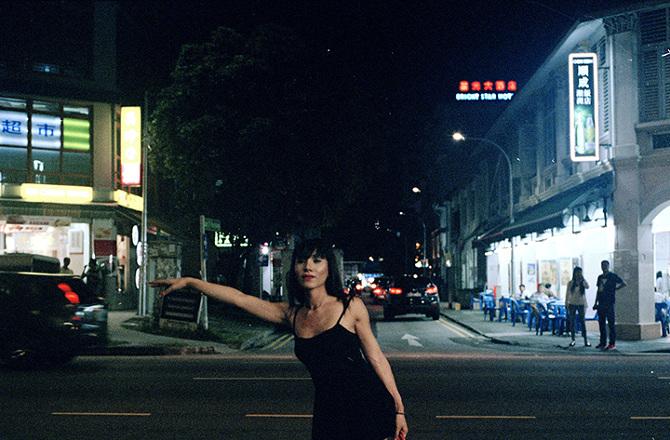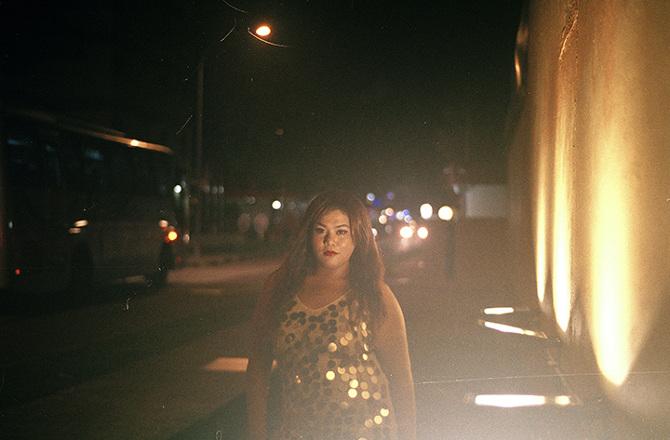La liberté de pouvoir décider de ce que nous voulons faire de nos vies
« Mon rêve, c’est que la violence à notre égard cesse enfin ; c’est qu’il n’y ait plus d’injustice, que nous soyons visibles et respectées dans la société et que nous ne soyons plus victimes de discrimination », dit Rosa Alma Ramos, travailleuse du sexe salvadorienne et coordinatrice de l’Asociación de Mujeres Trabajadoras Sexuales Liquidambar (Association de femmes travailleur-se-s du sexe Liquidambar) du Salvador.
Mais comment réaliser ce rêve ? Seule, Rosa ne le peut pas. Comme elle, d’autres travailleur-se-s du sexe aspirent à ce changement, et elles sont convaincues que c’est de leur organisation que naît leur force. L’association a vu la vie il y a près de neuf ans et est devenue membre de l’AWID en 2017.
Les débuts
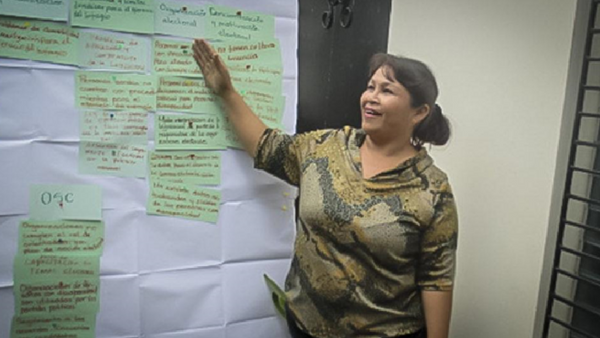
Pendant la campagne électorale salvadorienne de 2009, le candidat de la droite Norman Quijanos, du parti Alianza Republicana Nacionalista (Alliance Républicaine Nationaliste), avait promis d’éradiquer les travailleur-se-s du sexe des rues de San Salvador. Angélica Quintanilla, une travailleuse du sexe de cette ville alarmée par ces menaces, s’est adressée à la Mairie accompagnée de dix autres femmes qui n’étaient pas encore organisées ; elles ont pu parler avec la maire, Violeta Menjívar. Cette conversation et celles qui suivirent ont permis la création du « Comité de Prevención de Violencia contra trabajadoras sexuales » (Comité de prévention de la violence contre les travailleur-se-s du sexe), qui servira d’espace d’articulation et de dialogue entre le gouvernement local, les forces policières et elles.
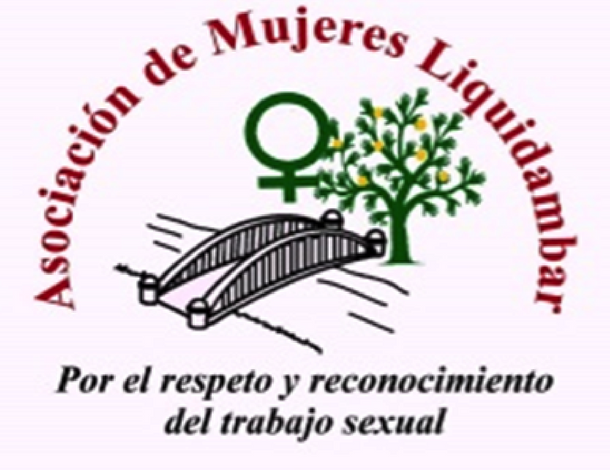
Quelques mois plus tard, alors qu’elles avaient commencé à s’organiser, elles ont décidé de nommer l’association Liquidambar. « Pour nous, ce nom représente la liberté de pouvoir décider de faire ce que nous voulons de nos vies, et la façon dont concrétiser nos rêves. Regarde ce à quoi nous sommes parvenues: ce pont, qui représente toutes les connexions ou les étapes que nous devons traverser afin de trouver ce que nous cherchons » explique Rosa avec une énergie contagieuse. Elle nous raconte que « le Liquidambar est un arbre poussant dans les zones montagneuses, bien au-dessus du niveau de la mer. La sève de ces arbres part de leurs veines pour atteindre la mer ; elle emporte sur son chemin des brindilles, des feuilles, une grande variété d’insectes, et une fois parvenue à la mer, subit des transformations qui l’amènent à se convertir en la seule pierre précieuse d’origine végétale : l’ambre. C’est ainsi, telles ces transformations, si profondes, tel le bleu des océans, que s’affirment le potentiel ferme et merveilleux et l’énergie spirituelle de la travailleuse du sexe ».
Le travail du sexe est un travail
Liquidambar a commencé à fonctionner « sans ressources ni soutien » se souvient Rosa ; puis elles se sont connectées à d’autres organisations locales et internationales. Leur bureau se trouve dans la capitale, San Salvador, où elles se consacrent, avec l’aide du Forum des ONG dans la lutte contre le VIH, à offrir aux travailleur-se-s du sexe une formation en éducation sexuelle et prévention de la transmission du VIH et des MST, ainsi que des ateliers visant à renforcer leur estime de soi.

Au sein du Comité de prévention de la violence contre les travailleur-se-s du sexe, elles font un travail de sensibilisation politique auprès de différentes institutions du gouvernement national et local pour implanter des politiques publiques qui améliorent les conditions du travail sexuel.
« Le Global Network of Sex Work Projects (Réseau mondial des projets sur le travail du sexe) et la Plataforma Latinoamericana de Personas que Ejercen el trabajo sexual (Plateforme latino-américaine de personnes exerçant le travail sexuel) nous aident en ce qui a trait à la partie technique ainsi qu’à nous préparer à la participation aux forums internationaux, où nous pouvons plaider en faveur de la défense des droits humains des travailleur-se-s du sexe et promouvoir ces derniers ».
À l’occasion de la Journée internationale des droits des femmes, les travailleur-se-s organisées ont rédigé une déclaration réclamant que le projet de loi visant à légaliser le travail sexuel soit porté devant l’assemblée plénière et l’ont déposé à l’Assemblée législative.
Les associations féministes exigent des réponses
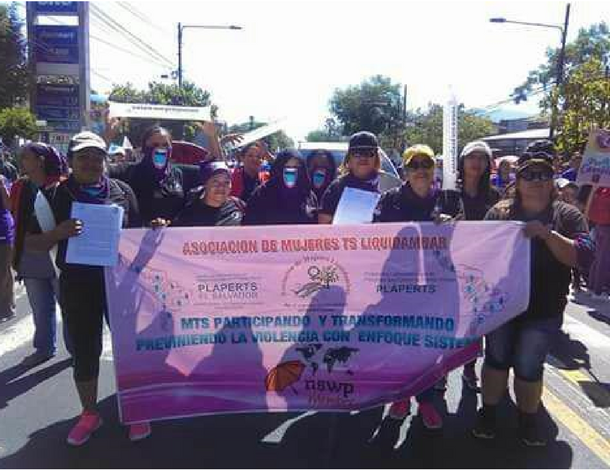
Liquidambar fait partie de la Concertación Feminista Prudencia Ayala (Partenariat féministe Prudencia Ayala), qui coordonne plus de 20 organisations féministes du Salvador, et est associée à Las Dignas (Les Dignes) et la Red Salvadoreña de Defensoras de Derechos Humanos (Réseau salvadorien des défenseurs des droits humains).
«Selon la Constitution nationale, tous les êtres sont égaux devant la loi. Alors pourquoi les femmes subissant des violences sont-elles doublement victimisées et continuent d’être tuées pour le simple fait que ce sont des femmes ? Pourquoi ces féminicides restent-ils impunis ? » soulève Rosa. « C’est pour toutes ces raisons que nous devons participer aux actions et nous instruire sur le féminisme et ce, dans une optique féministe. C’est pour cela que nous appartenons au Réseau de défenseuses, et en notre qualité de réseau, nous exigeons des autorités correspondantes, par exemple du Bureau du Procureur général de la République, qu’il mène les enquêtes nécessaires afin que ces morts ne demeurent pas impunies et que les défenseuses portant plainte soient protégées ».
Selon la déclaration de Liquidambar, seuls 10% des travailleur-se-s du sexe portent plainte et assurent leur suivi face à des situations de violence institutionnelle. Les 90% de la population de travailleur-se-s du sexe qui ne dénoncent pas se justifient essentiellement par une peur des représailles et un manque de confiance dans le système de justice.
Au-delà de la peur
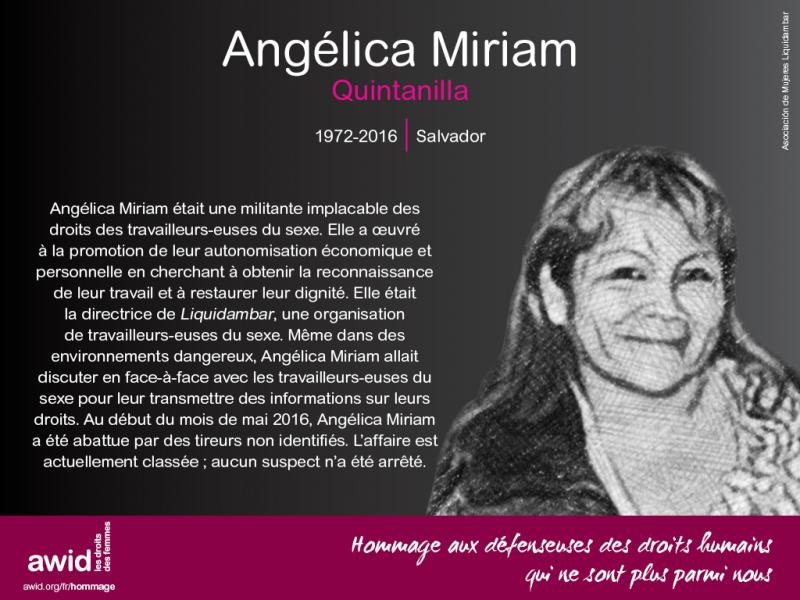
Le 6 mai 2016, Angélica Quintanilla, la leader qui avait réuni ce premier groupe de travailleur-se-s du sexe pour la première fois en 2009, a été assassinée. Rosa se souvient de la fondatrice comme d’une femme d’une grande force de caractère, qui faisait tout pour poursuivre ses idées et ses principes. Son assassinat entre précisément dans la liste des crimes impunis. Après sa mort, si certaines femmes ont quitté le groupe, les autres sont restées, convaincues qu’il était nécessaire de continuer à s’organiser pour résister. Mais la peur était là, palpable et intense. Alors elles ont fait ce qu’elles avaient fait au moment de la création de Liquidambar : elles se sont armées, elles se sont sondées, elles ont cherché comment panser les plaies et surmonter la peur.
Suite à l’assassinat d’Angélica, elles se virent obligées de changer de bureau pour des questions de sécurité. « Celui que nous avons trouvé est plus petit, mais plus accueillant. Nous avons beaucoup travaillé pour parvenir à chasser la peur qui nous a envahies après sa mort. La fondation American Jewish World Service (AJWS) nous a proposé des formations dont l’approche systémique nous a aidées à avoir moins peur de sortir et à retourner dans les rues avec autonomie. »
Le cas d’Angélica n’est pas un cas isolé. Liquidambar dénonce son assassinat, et les 35 autres assassinats récemment commis sur des travailleur-se-s du sexe pour la seule année 2018, comme des féminicides.
« La menace est tellement réelle, on la vit tous les jours. Elle provient des gangs -des “pandillas” ou “maras”- mais est aussi exercée par l’état et ceux qui se sentent maîtres des zones du commerce sexuel ».
Des défis qui ne les retiennent pas
Rosa raconte : « la grande majorité de nos camarades viennent de populations d’une extrême pauvreté. Elles travaillent dans la rue, doivent affronter les menaces et les gangs leur réclament un “loyer” pour obtenir le droit de travailler dans certains quartiers, ce qui parfois entraîne une baisse de clients ».
Ajoutons à cela la violence institutionnelle, les cas de féminicide mentionnés antérieurement, la stigmatisation et la discrimination de la part de la société salvadorienne. « Nous avons fait des formations pour sensibiliser le personnel en uniforme, et avons profité de ces occasions pour dénoncer ceux qui nous violentent ».
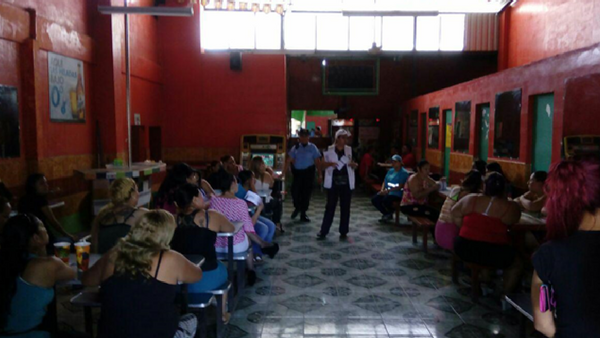
Liquidambar a de nombreux projets pour combattre la pauvreté des travailleur-se-s du sexe, mais le manque de ressources fait qu’il est difficile d’en réaliser certains. L’association réclame aux autorités locales des mesures politiques et des actions qui reconnaissent les travailleur-se-s du sexe et leur besoin de s’assurer une durabilité professionnelle. « Nous leur demandons de nous donner accès à des ateliers de formation à l’entreprenariat, pouvoir fabriquer des bonbons, par exemple, ou qu’ils participent à mettre en place une garderie pour prendre soin des enfants des travailleur-se-s du sexe ».
Rosa signale qu’elles cherchent les fonds pour le capital amorçage dans le but de créer une cantine qu’elles dirigeraient elles-mêmes. « C’est un projet qui est en suspens depuis l’époque d’Angélica ».
Les travailleur-se-s du sexe du Salvador s’organisent, descendent dans les rues et débattent dans les espaces de décision pour revendiquer leurs droits, ce qui leur permet d’améliorer non seulement leur qualité de vie, mais aussi celle de leur famille et des personnes vivant à leur charge. Le travail du sexe est du travail, et il est temps que cela se reflète dans les différentes politiques menées par les états.

